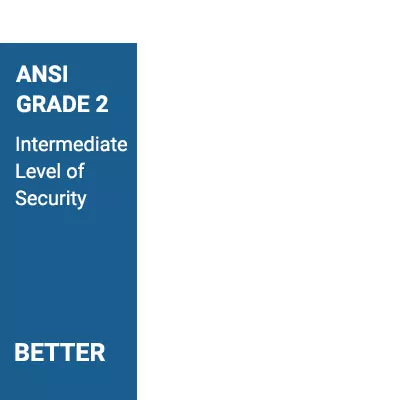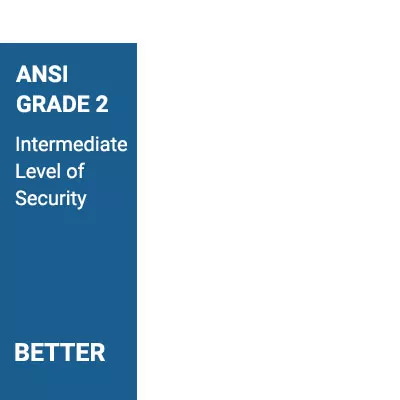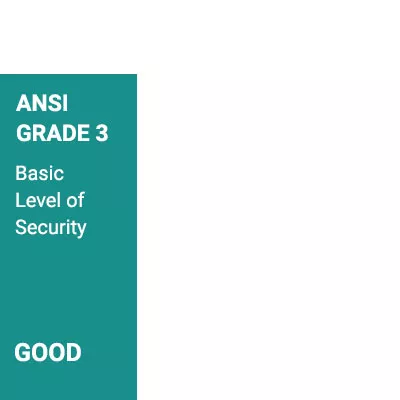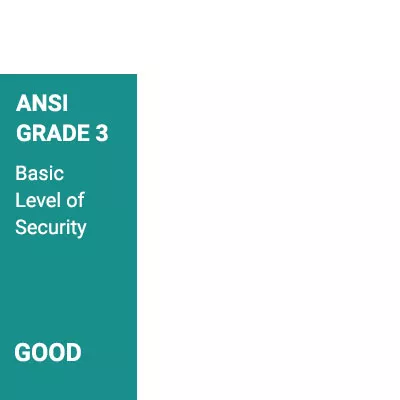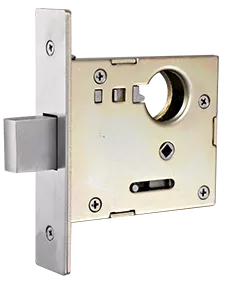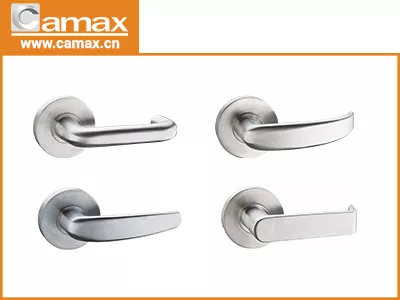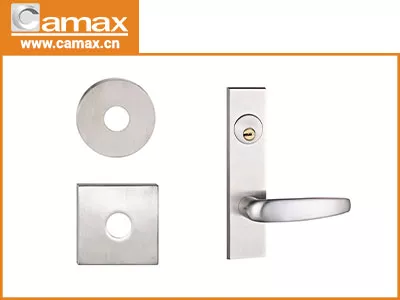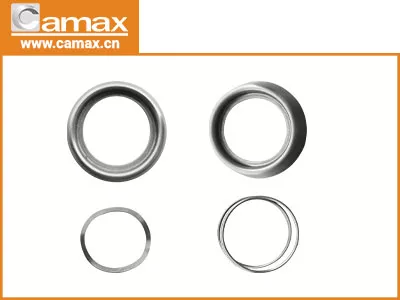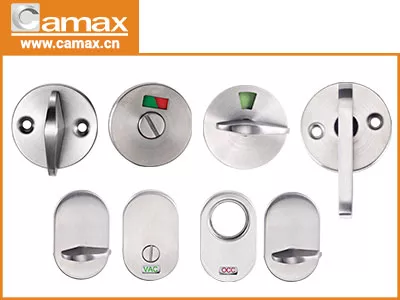ANSI Mortise Locks
For Commercial & Institutional Doors
ANSI Grade 1 certified mortise locks meeting BHMA/ANSI standards
for durability, fire safety, and forced-entry resistance.

ANSI Mortise Locks
ANSI Grade 1 certified mortise locks meeting BHMA/ANSI standards for durability, fire safety, and forced-entry resistance.

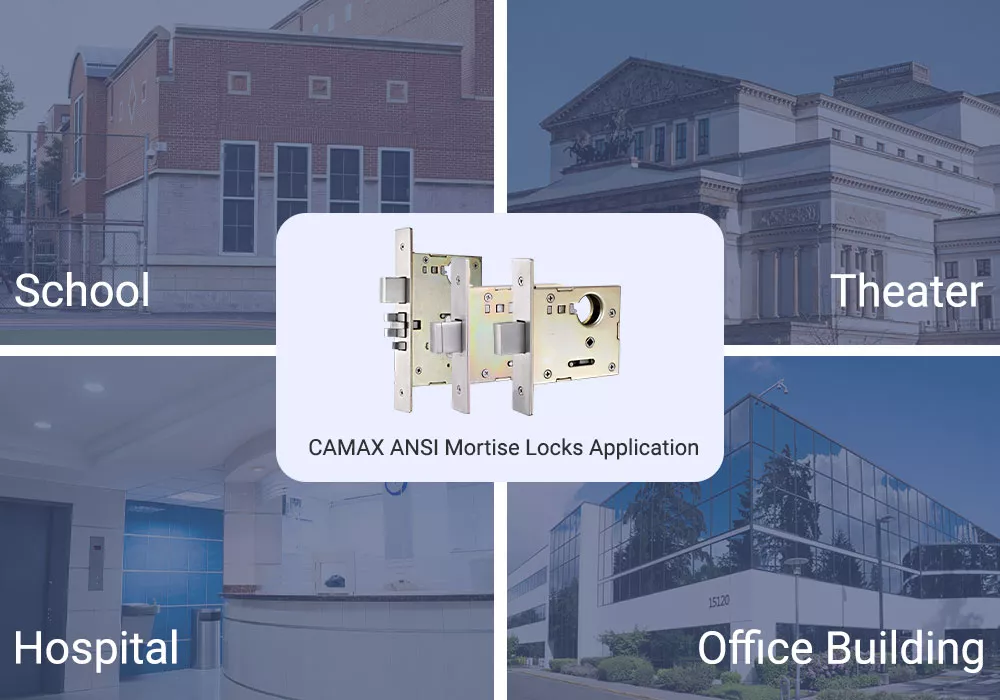
ANSI Mortise Locks: Security & Durability Redefined
ANSI mortise locks are robust locking mechanisms engineered for enhanced security in high-traffic environments. Designed to fit into a pocket within the door, these locks provide superior strength and resistance to forced entry. Ideal for commercial and institutional applications, they ensure fire safety and code compliance while delivering long-lasting performance.
Applications:
Commonly used in offices, hospitals, schools, hotels, and other commercial spaces, ANSI mortise locks offer a perfect blend of security and durability.
ANSI Lock Grades: Choosing the Right Security Level
Learn the distinctions between Grade 1, Grade 2, and Grade 3 locks for various security needs. ANSI mortise locks are classified into three grades based on durability and usage.
ANSI Grade 1
Designed for over 1 million cycles, providing the highest security for high-traffic areas like hospitals and airports. Grade 1 offers the best forced-entry resistance, making it the preferred choice for critical commercial applications.
ANSI Grade 2
Tested for 500,000 cycles, ideal for offices and schools with moderate traffic.
ANSI Grade 3
Rated for 200,000 cycles, suitable for light commercial and residential use.
Camax Hardware Offers Divers Types of ANSI Mortise Locks
Camax Hardware manufactures a variety of ANSI mortise locks tailored to meet different commercial needs.
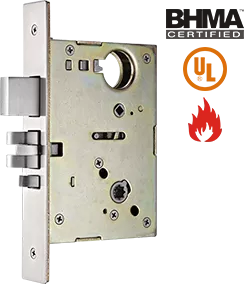
Types: ANSI Commercial Mortise Locks
Certificates: BHMA listed; ANSI/BHMA A156.13-2020, grade 1 (1,000,000); UL10C, 3-hour fire rating
Function & Application: Universal lock case - multiple functions in one case; Field-reversible handing without opening lock case; Locking thumbturn on the inside of door visually shows whether the door is locked or unlocked; Independent lever rotation.
| Outside/Inside | SKU | Type | ANSI | Function Description |
|---|---|---|---|---|
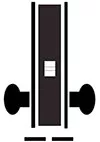 |
CML801 | Passage Latch | F01 | Latch bolt operated by lever from either side at all times. |
 |
CML802 | Privacy, Bedroom or Bath Lock | F22 | Latch bolt retracted by knob / lever from either side unless outside is locked by inside thumbturn or outside coin turn. Operating inside knob / lever, closing door, rotating inside thumbturn or rotating outside coin turn unlocks outside knob / lever. Inside knob / lever is always free for immediate egress. |
 |
CML802B | Privacy, Bedroom or Bath Lock | F22 | Latch bolt retracted by knob / lever from either side unless outside is locked by inside thumbturn. Operating inside knob / lever, closing door, or operating outside emergency release unlocks outside knob / lever. Inside knob / lever is always free for immediate egress. |
 |
CML804 | Office and Inner Entry Lock | F04 | Latch bolt operated by lever from either side except when outside lever is made inoperative by thumbturn or key. When outside lever is locked, latch bolt is retracted by key from outside or by operating inside lever. Auxiliary dead latch. |
 |
CML805 | Classroom Lock | F05 | Latch bolt operated by lever from either side except when outside lever is locked from outside by key. When outside lever is locked, latch bolt is retracted by key, or by operating inside lever. Auxiliary dead latch. |
 |
CML807 | Storeroom Lock | F07 | Latch bolt operated by key from outside or by operating inside lever. Outside lever is always inoperative. Auxiliary dead latch. |
 |
CML809 | Apartment Entrance Lock | F09 | Latch bolt operated by lever from either side, except when outside lever is locked by key from inside. When outside lever is locked, latch bolt is retracted by key from outside or by operating inside lever. Auxiliary dead latch. |
 |
CML813 | Corridor Lock | F13 | Latch bolt operated by lever from either side. Dead bolt projected by key from outside and turn from inside. Operating inside lever retracts both bolts and unlocks outside. |
 |
CML814 | Store/Utility Room Lock with Deadbolt | F14 | Latch bolt operated by lever from either side. Dead bolt operated by key from either side. |
 |
CML816 | Dead Lock | F16 | Dead bolt operated by key from either side. |
 |
CML817 | Dead Lock | F17 | Dead bolt operated by key from outside and by turn from inside. |
| CML818 | Dead Lock | F18 | Dead bolt operated by key from outside only. | |
 |
CML819 | Privacy with Deadbolt and Coin Turn Outside | F19 | Latchbolt retracted by knob/lever from either side. Deadbolt thrown or retracted by inside thumbturn or outside coin turn. Throwing deadbolt locks outside knob/lever. Rotating inside konb/lever simultaneously retracts deadbolt and latchbolt, and unlocks outside knob/lever. Rotating outside coin turn retracts deadbolt and unlocks outside knob/lever. Availab with rose trim only. Inside lever is always free for immediate egrees. |
 |
CML819B | Privacy with Deadbolt and Cylinder Outside | F19 | Latchbolt retracted by knob/lever from either side. Deadbolt thrown or retracted by inside thumbturn or outside CYLINDER. Throwing deadbolt locks outside knob/lever. Rotating inside konb/lever simultaneously retracts deadbolt and latchbolt, and unlocks outside knob/lever. Rotating outside CYLINDER retracts deadbolt and unlocks outside knob/lever. Availab with rose trim only. Inside lever is always free for immediate egrees. |
 |
CML820 | Entrance Lock | F20 | Latch when outside from either side,except whenoutside lever is made inoperativeby thumbturn. Dead bolt operated by key outside orturn inside. Key outside operates both bolts. Operating inside lever retracts both bolts and outside remains locked. Latch bolt is dead locked when outside lever is made inoperative or when thedead bolt is projected. When dead bolt is retracted, lever is unlocked by thumbturn. |
 |
CML821 | Room Door Lock | F21 | Latch bolt operated by lever from either side. Dead bolt operated by key from outside and turn from inside. |
 |
CML829 | Classroom Dead Lock | F29 | Key from outside operates dead bolt. Turn from inside retracts but does not project dead bolt. |
 |
CML832 | Intruder Latch Bolt Lock | F32 | Latch bolt operated by lever from either side except when outside lever is locked from inside or outside by key. When outside lever is locked, latch bolt is retracted by key from inside or outside or by operating inside lever. Auxiliary dead latch. |
 |
CML833 | Intruder Dead Bolt Lock | F33 | Latch bolt operated by lever from either side except when outside lever is locked from inside or outside by key. Dead bolt retracted by key from inside or outside. Operating inside lever retracts both bolts and unlocks outside. |
 |
CML834 | Intruder Dead Bolt Lock | F34 | Latch bolt operated by lever from either side except when outside lever is locked from inside or outside by key. Dead bolt retracted by key from inside or outside. Operating inside lever retracts both bolts and unlocks outside. Auxiliary dead latch or latch bolt dead locked when dead bolt is thrown. |
| CML831 | Exit or Communicating Lock | F31 | Latch bolt operated by lever from inside. Non removable blank trim or no trim outside. |
| Outside/Inside | SKU | Type | ANSI | Function Description |
|---|---|---|---|---|
 |
CML801 | Passage Latch | F01 | Latch bolt operated by lever from either side at all times. |
 |
CML802 | Privacy, Bedroom or Bath Lock | F22 | Latch bolt retracted by knob / lever from either side unless outside is locked by inside thumbturn or outside coin turn. |
 |
CML802B | Privacy, Bedroom or Bath Lock | F22 | Latch bolt retracted by knob / lever from either side unless outside is locked by inside thumbturn. |
 |
CML804 | Office and Inner Entry Lock | F04 | Latch bolt operated by lever from either side except when outside lever is made inoperative by thumbturn or key. |
 |
CML805 | Classroom Lock | F05 | Latch bolt operated by lever from either side except when outside lever is locked from outside by key. |
 |
CML807 | Storeroom Lock | F07 | Latch bolt operated by key from outside or by operating inside lever. Outside lever is always inoperative. |
 |
CML809 | Apartment Entrance Lock | F09 | Latch bolt operated by lever from either side, except when outside lever is locked by key from inside. |
 |
CML813 | Corridor Lock | F13 | Latch bolt operated by lever from either side. Dead bolt projected by key from outside and turn from inside. |
 |
CML814 | Store/Utility Room Lock with Deadbolt | F14 | Latch bolt operated by lever from either side. Dead bolt operated by key from either side. |
 |
CML816 | Dead Lock | F16 | Dead bolt operated by key from either side. |
 |
CML817 | Dead Lock | F17 | Dead bolt operated by key from outside and by turn from inside. |
| CML818 | Dead Lock | F18 | Dead bolt operated by key from outside only. | |
 |
CML819 | Privacy with Deadbolt and Coin Turn Outside | F19 | Latchbolt retracted by knob/lever from either side. Deadbolt thrown or retracted by inside thumbturn or outside coin turn. |
 |
CML819B | Privacy with Deadbolt and Cylinder Outside | F19 | Latchbolt retracted by knob/lever from either side. Deadbolt thrown or retracted by inside thumbturn or outside CYLINDER. |
 |
CML820 | Entrance Lock | F20 | Latch when outside from either side,except whenoutside lever is made inoperativeby thumbturn. |
 |
CML821 | Room Door Lock | F21 | Latch bolt operated by lever from either side. Dead bolt operated by key from outside and turn from inside. |
 |
CML829 | Classroom Dead Lock | F29 | Key from outside operates dead bolt. Turn from inside retracts but does not project dead bolt. |
 |
CML832 | Intruder Latch Bolt Lock | F32 | Latch bolt operated by lever from either side except when outside lever is locked from inside or outside by key. |
 |
CML833 | Intruder Dead Bolt Lock | F33 | Latch bolt operated by lever from either side except when outside lever is locked from inside or outside by key. |
 |
CML834 | Intruder Dead Bolt Lock | F34 | Latch bolt operated by lever from either side except when outside lever is locked from inside or outside by key. |
| CML831 | Exit or Communicating Lock | F31 | Latch bolt operated by lever from inside. Non removable blank trim or no trim outside. |
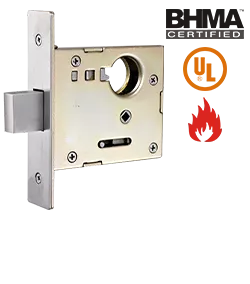
Types: Deadbolt Lock
Certificate: ANSI/BHMA A156.36, grade 1; UL10C, 3-hour fire rating
Material: Stainless Steel
Finish: SSS; AB; PVD
| Outside/Inside | SKU | Type | ANSI | Function Description |
|---|---|---|---|---|
 |
CML816D | Dead Lock | F16 | Dead bolt operated by key from either side. |
 |
CML817D | Dead Lock | F17 | Dead bolt operated by key from outside and by turn from inside. |
 |
CML818D | Dead Lock | F18 | Dead bolt operated by key from outside only. |
 |
CML829D | Classroom Dead Lock | F29 | Key from outside operates dead bolt. Turn from inside retracts but does not project dead bolt. |
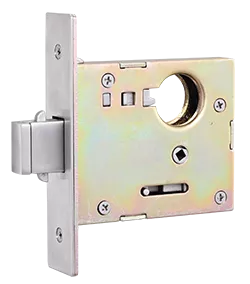
Types: Mortise Lock Set for Sliding Doors
Function: Self-retracting hook with non-marring latch bolt
Material: Stainless steel 304 deadbolt with 1" (25.4 mm) throw; Stainless steel face plate
Components for ANSI Mortise Locks
Camax manufactures stainless steel lever handles for ANSI mortise locks, available in multiple finishes.
Camax offers full-face escutcheons and roses in round or square shapes for ANSI mortise locks.
Camax manufactures stainless steel compression rings for ANSI mortise locks in various heights and finishes.
Camax's thumbturns and indicators for ANSI mortise locks are crafted from stainless steel and available in multiple finishes.
Camax manufactures ANSI-certified cylinders with 304 stainless steel head covers, available with various keying options.
ANSI Residential Mortise Locks
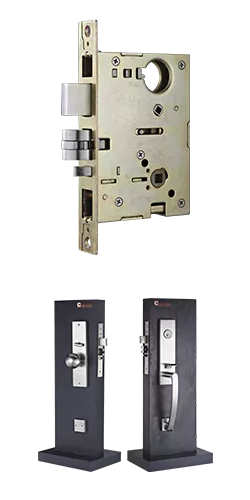
Types: Residential Entrance Mortise Lock
Compliance: ANSI A156.13-2005, Grade 1; UL fire rated
Function: Locking thumbturn on the inside of door visually shows whether the door is locked or unlocked.
Lockcase: Heavy gauge steel, with zinc dichromate finish for corrosion resistance.
Deadbolt: One-piece stainless steel, 25mm throw.
Latchbolt: Stainless steel, 2 piece mechanical with anti-friction insert, 19mm throw.
Auxiliary Latchbolt: Stainless steel.
Strike: Stainless steel, ANSI straight lip standard, 4-7/8" (124mm) x 1-1/4" (32mm)
Door Thickness: 1-3/4" (45mm) standard. Optional 1-3/8" (35mm), 2-1/2" (64mm)
Backset: 2-3/4" (70mm).
Camax Trusted by Global Facilities for ANSI Mortise Locks
Certified quality, advanced manufacturing, and global expertise.
OEM/ODM Services
Camax Hardware provides flexible OEM and ODM services, allowing clients to customize door coordinators to their specific needs. With expert engineering support and advanced manufacturing capabilities, Camax ensures each product meets precise requirements, enhancing brand value and market competitiveness while maintaining exceptional quality and performance.
Certifications
Camax Hardware's door coordinators are certified to meet global safety and quality standards, including UL. These certifications ensure compliance with international fire safety and building regulations, providing peace of mind and reliability for commercial projects. Camax’s commitment to excellence guarantees top-quality hardware you can trust in any environment.
Advanced Manufacturing
Camax Hardware leverages state-of-the-art manufacturing facilities equipped with cutting-edge machines and rigorous testing equipment. This advanced setup ensures precision, durability, and consistency across all door coordinator products. Camax's commitment to innovation guarantees high-performance hardware solutions that exceed industry standards and meet the demands of modern commercial applications.
Solutions: Mortise Lock Integration with Panic Exit Devices
Seamless compatibility with panic exit systems for enhanced safety and compliance
Need professional guidance for panic exit devices integrated with mortise locks?
Contact us for expert services and technical support.
Contact Camax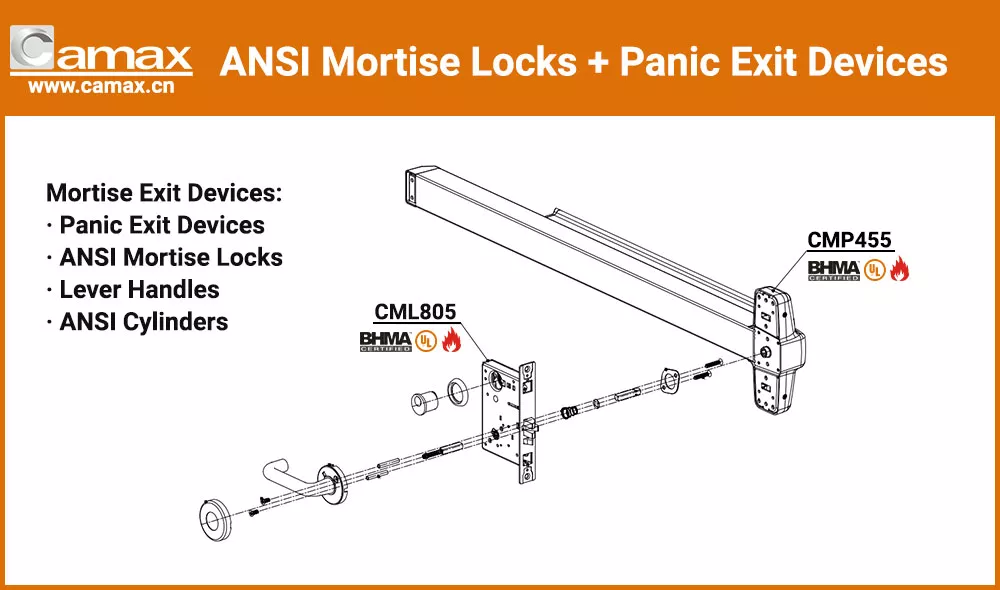
Everything You Need to Know About ANSI Mortise Locks
Find answers to the most common questions about ANSI mortise locks.
Q1. What is the difference between an ANSI mortise lock and a cylindrical lock?
ANSI mortise locks and cylindrical locks differ in both structure and application. Mortise locks are installed within a pocket, or "mortise," cut into the door itself, making them highly secure and durable. Mortise designs also allow integration with panic hardware and access control systems, making them the professional choice for hospitals, schools, and fire-rated applications. In contrast, cylindrical locks are surface-mounted through a hole bored in the door, which makes them easier to install but generally less robust. While cylindrical locks are more common in residential applications, mortise locks are preferred for high-traffic areas due to their superior durability and security.
Q2. Can I customize the lock design for specific projects?
Absolutely! Camax Hardware provides OEM and ODM services, enabling customization of ANSI mortise locks to meet specific project requirements. Whether you need custom finishes, unique handle designs, or modifications to fit non-standard door preparations, Camax can deliver tailored solutions. Our advanced manufacturing capabilities allow for precise adjustments, ensuring that each lock is crafted to your exact specifications. This flexibility is ideal for large-scale commercial projects, specialized institutional applications, and architectural designs where standard options may not be sufficient. Contact Camax today to create locks that match your vision.
Q3. Are Camax Hardware's ANSI mortise locks fire-rated?
Yes, Camax ANSI mortise locks are designed to meet stringent fire safety standards, ensuring reliable performance during emergencies. For example, CML800 Series are UL 10C certified for up to 3-hour fire-ratings. In the event of a fire, Camax mortise locks provide secure closure, preventing the spread of smoke and flames while maintaining egress routes for safe evacuation. Their fire-rated certification makes them suitable for use in hospitals, schools, commercial buildings, and any facility requiring strict adherence to safety codes.
Q4. What certifications do Camax mortise locks have?
Camax ANSI mortise locks are certified to meet global safety and quality standards, including UL, and ANSI certifications. The UL certification guarantees that the locks meet rigorous fire safety and mechanical durability requirements, making them suitable for fire-rated doors, while ANSI certification affirms adherence to American standards for strength and security. These certifications are a testament to Camax's commitment to quality, reliability, and international compliance, making our mortise locks trusted worldwide.
Contact Camax Hardware for Door Solutions
Specifying door and window hardware for your next project? Our expert team ensures seamless integration from design to installation.
Contact Camax Hardware for Door Solutions
Specifying door and window hardware for your next project? Our expert team ensures seamless integration from design to installation.



